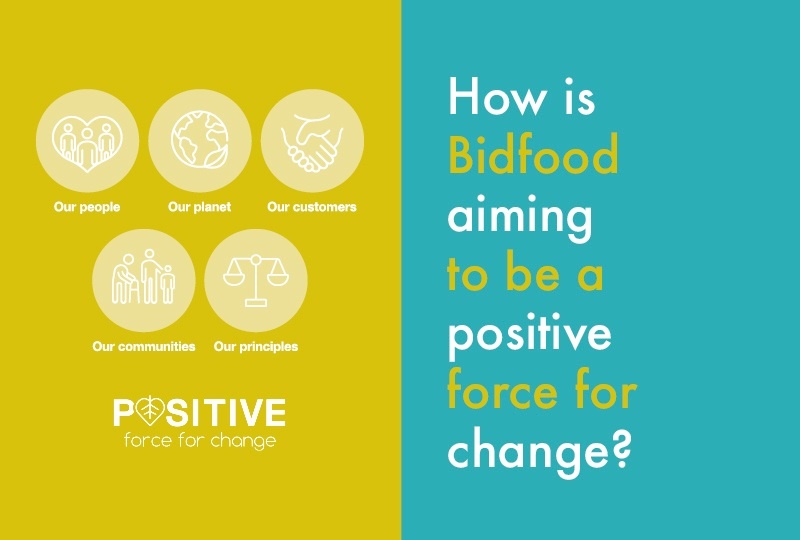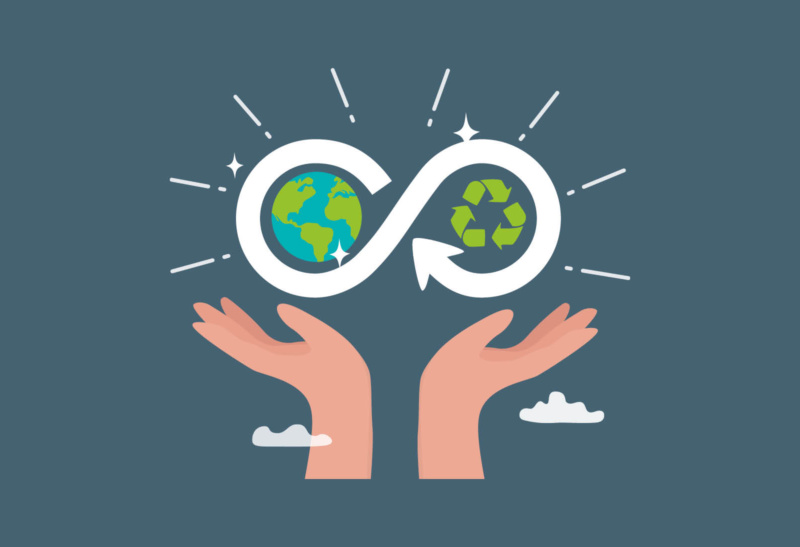With such a wide range of ethical and environmental issues needing to be addressed, Bidfood plans to step up to these challenges and ensure we are a positive force for change. We have recently refreshed our sustainability strategy, which refocuses our attention on key areas where we will drive improvements.
Business as usual is no more. Bidfood is stepping up to the plate to do our bit for environmental, social and governance issues.
Integrating sustainability at the core of our business
2022 has seen the end of our 3 year sustainability strategy which has had some major highlights and impacts across all areas. For example, we were the first UK foodservice wholesaler to commit to setting science-based net zero targets.
But we want to do more. We need to do more. So we have realigned our vision, which now states ‘Bidfood’s vision is to be the best foodservice provider, and a positive force for change’.
By changing our vision, we have embedded sustainability into the heart of our business, which is where it needs to be. We have refreshed our targets, reviewed all areas of our strategy to select the areas where we can make the most impact, and ensured we have set ambitious goals within this. We have also simplified our categories, and now have five areas that our strategy falls into – our people, our planet, our customers, our communities and our principles.
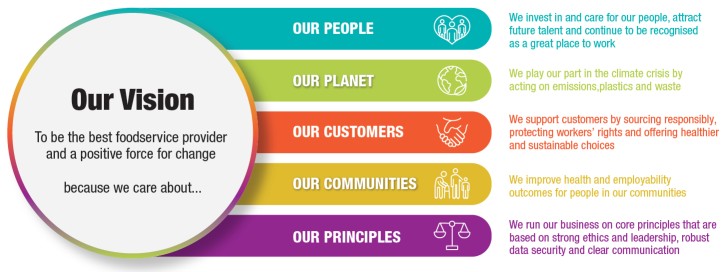
Our people are at the heart of what we do
We’re investing in our employees to ensure we have a happy, healthy and engaged workplace. We’ve created our Health and Wellbeing strategy, aligned to the overall ESG strategy. It contains a number of initiatives to support our employees with their mental, physical, social and financial health.
We’ve started a menopause support group, a community of employees and line managers who come together to discuss the challenges faced during menopause and share hints and tips. We’re investing in apprenticeships and have created a comprehensive guide which explains what apprenticeships are to our employees, what they can study and how they work.
Alongside this, we’re supporting our managers with tools and training so they can provide the best opportunities for team members. For example, we’ve created our Mental Health Awareness training for People Managers which over 51% of line managers have now taken. In the next couple of months, we will also be launching our ‘Foundations of Engagement’ programme which will help managers understand what to look for when creating the best environments for their teams.
We don’t do this without the input from our employees though, so we complete annual employee engagement and wellbeing surveys and will soon be introducing pulse surveys to get more regular feedback and tailor our support accordingly.
Working on our net zero commitment
We’ve been working with Carbon Intelligence to calculate our scope 3 emissions baseline, which is a key step to setting our reduction targets. Our commitment to setting both near-term and long-term science-based targets (with an overall aim of achieving net zero emissions by 2045) means that we need to reduce our emissions by 90% and put in place credible offsets for the residual emissions – up to a maximum of 10% of total emissions.
This is a very challenging target but essential to maintain a liveable and productive planet. Our Scope 1 and 2 emissions only make up circa 6% of our overall carbon footprint, but it’s essential for us to decarbonise these as much as possible, not only because they contribute to the Scope 3 emissions of our customers, but because it’s essential we lead by example, given that we are asking our suppliers to do likewise.
We are working on our decarbonisation plans but in the meantime, we’ve got an HVO (Hydro-treated vegetable oil) trial underway on our fleet; decarbonisation of our trucks is very challenging as the payload of electric vehicle batteries is operationally not feasible for us. Until technology has advanced further, we are considering whether we can use HVO more widely. Our trial is running on 10 vehicles from our Edinburgh depot, and has the potential to deliver up to 90% less CO2e compared to conventional diesel.
We also have a project underway to investigate the feasibility of generating more renewable energy on-site. Alongside this, we’ve been switching to lower GHG refrigerants and reducing food waste. All of these have helped to contribute to a continued reduction in emissions since 2015 as shown in the graph below.
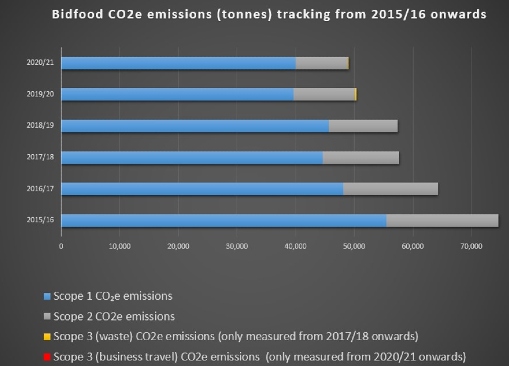
Working together with our customers and suppliers
Many of our customers also have ambitious goals and commitments that they are working to achieve, and we are keen to enable this progress.
We have product policies in place which improve the ethical and environmental sustainability of our range and cover areas such as palm oil, plastics and animal welfare. We collaborate with our suppliers to support the shift to more sustainable sourcing – for example, we have recently sent a detailed questionnaire to suppliers to identify farm animal welfare and soya standards in our supply chain. Once we’ve received information back from this questionnaire, we will put further targets in place to continue to improve standards in our supply chain, aiming to be a positive force for change and drive improvements within the wholesale supply chain.
We’re also making progress with reducing plastic, and are on track for meeting targets aligned with the 2025 Plastics Pact. We will keep up pace in this area, and report on this in our Sustainability Report each year – we want to make sure we are transparent and therefore accountable. Our progress against our plastics targets are detailed in the diagram below.
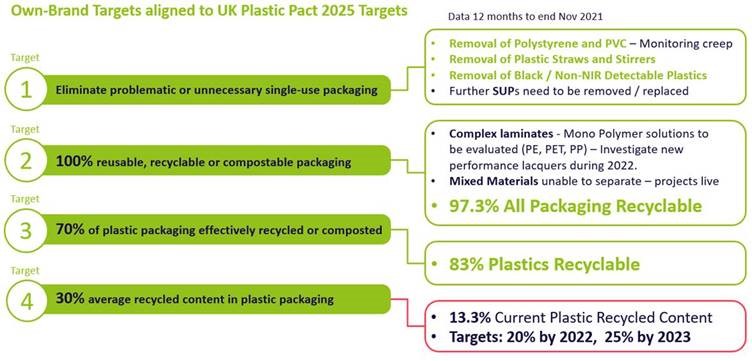
Helping our communities
We have a number of charities which we are supporting at a corporate level, including Hospitality Action, Springboard and the Natasha Allergy Research Foundation. One of the most recent additions to our charity list is Hope4, who are working to distribute food and essential items to refugees in Moldova and other European countries that are fleeing the war in Ukraine.
Our depots regularly hold fundraisers to raise money for our communities near and far. Recent activities have included employees from Bicester, Basingstoke and Paddock Wood depots cycling from Spain to Portugal to raise money for Dallaglio Rugby Works, which uses sport to teach key life skills to young people who are disengaged from education.
We have also had an employee hiking for Macmillan Cancer Support and multiple fundraisers and donation drives to support those most affected by the war in Ukraine. We are donating food to local food banks and animal sanctuaries, and have been working with FareShare since 2016 to redistribute surplus food to good causes across the UK. As recently as May 2022, we saw two additional depots make their first donations to FareShare, with many more donations to follow.
Don’t forget our principles
We have a strong control environment to ensure we are meeting all legislation and operating on core principles of ethics and leadership, robust data security and clear communication.
We are committed to reporting on our sustainability KPI’s and will be implementing an externally recognised reporting framework in the next year. We are signed up to the Better Business Act coalition alongside over 1000 other businesses who are pressing government for a change to Section 172 of the Companies Act which would mean businesses need to balance the interests of people, planet and profit. By changing company law, the act would create a level playing field for all companies by creating a legal obligation for CEOs to consider wider stakeholder needs, i.e. people and planet as well as profit.
Bidfood is committed to being a positive force for change, reducing our negative environmental impacts and improving outcomes for our people and communities. We know time is ticking, and never has there been more urgency in our sustainability strategy.
Whether you’re a customer, supplier, present or future employee, or just someone interested in what our plan is, find out more about what we are doing here: Positive force for change | sustainability | Bidfood UK
Hungry for more? Check out our related blogs:
- Journey to net zero – where do you start?
- What does Earth Day mean to Bidfood?
- How is Bidfood supporting apprenticeships?
- 4 challenges with carbon labelling on menus
- What I learnt about regenerative farming | Julie Owst
- How to master your sustainability communication online
- 3 reasons why we signed up to the Better Business Act coalition
